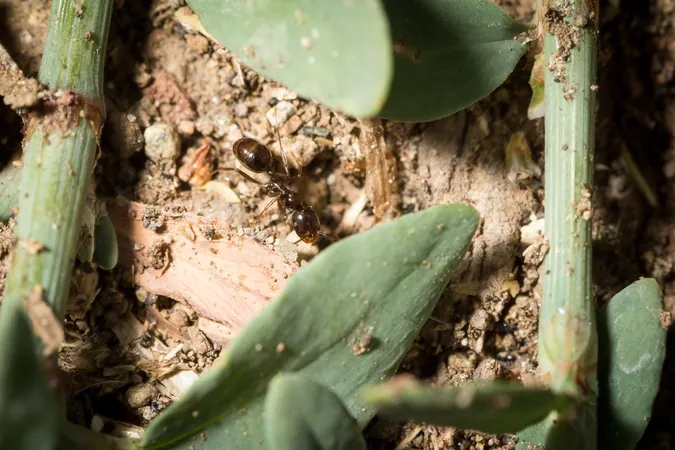
Shock Discovery: Ants Can Produce Offspring From Different Species!
2025-09-18
Author: Emily
Groundbreaking Research Unveils Unbelievable Ant Reproduction!
A team of researchers from the University of Montpellier has made an astonishing discovery that challenges long-held beliefs about animal reproduction. In a groundbreaking paper published in *Nature*, they revealed that a species of ant, known as Messor ibericus, can produce offspring not just of its own kind, but also of a completely different species!
For ages, it has been accepted that animals only produce offspring within their own species—except in cases like mules, which are sterile hybrids. This research shatters that assumption, opening the doors to a deeper understanding of hybridization and reproduction within the animal kingdom.
Meet Messor ibericus: The Ant That Defies Nature!
The Messor ibericus ant, classified as xenoparous, engages in a fascinating reproductive strategy allowing it to lay eggs that yield hybrids between Messor ibericus and Messor structor—two species that diverged roughly five million years ago, a division similar to that of humans and chimpanzees, according to researcher Johnathan Romiguier.
Hybrid Workers: A Common but Unique Phenomenon!
While hybridization isn’t unheard of in ant colonies, particularly when queens mate with males from different species to produce hybrid workers, the situation here is extraordinary. Usually, these hybrid workers are infertile, yet they excel in their roles, contributing significantly to the colony’s labor force.
Interestingly, some M. ibericus colonies producing hybrid workers exist hundreds of miles from any M. structor population, making traditional mating between these species impossible. This raises the question: how do they produce these hybrids?
The Science Behind the Surprising Reproduction!
The research team conducted DNA analysis of the M. ibericus colonies and discovered that 11.5% of the ants in these colonies were M. structor drones. Intriguingly, every ant, including non-hybrid M. structors, carried mitochondrial DNA exclusively from M. ibericus—indicating a maternal lineage.
They then focused on the eggs laid by M. ibericus queens and uncovered that approximately 10% were pure M. structor, suggesting a unique capability of these ants to create males of a different species without traditional mating.
Cloning Ants: A Remarkable Reproductive Strategy!
The study further indicated that M. ibericus queens can not only produce hybrids but can also clone M. structor males by fertilizing an egg without a nucleus or eliminating the maternal genome post-fertilization. While the cloning of males of their own species has been documented in various ant species, this is the first instance of cloning a male from another species.
An Unprecedented Discovery with Massive Implications!
This revolutionary finding not only opens up new avenues in the study of ant behavior and reproduction but also raises intriguing questions about the evolutionary strategies of species. What else might remain undiscovered in the vibrant, complex world of ants?









 Brasil (PT)
Brasil (PT)
 Canada (EN)
Canada (EN)
 Chile (ES)
Chile (ES)
 Česko (CS)
Česko (CS)
 대한민국 (KO)
대한민국 (KO)
 España (ES)
España (ES)
 France (FR)
France (FR)
 Hong Kong (EN)
Hong Kong (EN)
 Italia (IT)
Italia (IT)
 日本 (JA)
日本 (JA)
 Magyarország (HU)
Magyarország (HU)
 Norge (NO)
Norge (NO)
 Polska (PL)
Polska (PL)
 Schweiz (DE)
Schweiz (DE)
 Singapore (EN)
Singapore (EN)
 Sverige (SV)
Sverige (SV)
 Suomi (FI)
Suomi (FI)
 Türkiye (TR)
Türkiye (TR)
 الإمارات العربية المتحدة (AR)
الإمارات العربية المتحدة (AR)